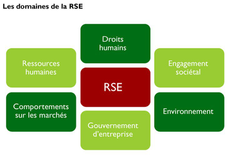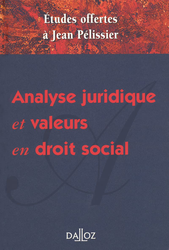April 18, 2023
Newsletter MAFR - Law, Compliance, Regulation

♾️ follow Marie-Anne Frison-Roche on LinkedIn
♾️ subscribe to the Newsletter MAFR Regulation, Compliance, Law
____
► Full Reference: M.-A. Frison-Roche, "Pour un consommateur "vigilant" : l'éduquer. Analyse juridique" ("For a "vigilant" consumer: educate him. Legal analysis"), Newsletter MAFR - Law, Compliance, Regulation, 18 April 2023.
____
📧Read by freely subscribing other news of the Newsletter MAFR - Law, Compliance, Regulation
____
🔴For an efficient Compliance Law: an Ex Ante responsibility in alliance with consumer expectations
A survey confirms that consumers integrate the monumental goals that generate compliance duties and obligations on the companies that sell them products. But this does not create a duty on them to prefer these products over others: they do not feel "responsible" for them. Compliance Law is based on ex ante responsibility and shared duty. So, faced with this attitude, what can the Law do?
____
📧read the article ⤵️
Feb. 2, 2021
Thesaurus : Doctrine
► Référence complète : A. Hatchuel, B. Segrestin, "Devoir de vigilance : la norme de gestion comme source de droit ?", Droit & Société, n° 106, 2020, p. 667-682.
____
► Résumé de l'article (fait par les auteurs) : La loi sur le devoir de vigilance introduit un mécanisme de responsabilisation atypique et insuffisamment conceptualisé. En faisant porter l'obligation des sociétés sur l'élaboration d'une gestion prévisionnelle des risques tout au long de la chaîne d'approvisionnement, la loi recourt à une "norme de gestion". L'article analyse les fondements de cette notion et montre qu'elle a été mobilisée à plusieurs reprises dans l'histoire du droit, pour accompagner les dynamiques de l'entreprise et responsabiliser ses relations avec les sociétés et les États. Il montre que le droit puise dans les connaissances et les méthodes en gestion de chaque époque, pour qualifier ce qu'est une action collective raisonnablement responsable, c'est-à-dire une action qui limite les risques encourus par les parties concernées. Prendre en compte les normes de gestion permet de repenser le statut des dirigeants et la responsabilité des entreprises. Cela ouvre aussi des perspectives théoriques nouvelles pour les sciences sociales.
________
Feb. 2, 2021
Thesaurus : Doctrine
► Référence complète : T. Sachs, J. Tricot, "La loi sur le devoir de vigilance : un modèle pour (re)penser la responsabilité des entreprises", Droit & Société, n° 106, 2020, p. 683-698.
____
► Résumé de l'article (fait par les auteurs) : Grâce à une ingénierie juridique très sophistiquée, les entreprises multinationales se jouent des frontières entre sociétés commerciales et entre États, parvenant ainsi à échapper à toute responsabilité. L’impuissance des États, qui devraient alors déléguer aux acteurs eux-mêmes le soin de développer des instruments de responsabilité sociale des entreprises, est-elle une fatalité ? Alors que certains voudraient confier la fabrication des normes de gouvernance aux acteurs, la loi sur le devoir de vigilance pourrait constituer un modèle d’une articulation originale et équilibrée entre hétéronomie et autonomie normative. Cet article entend mettre en lumière les caractéristiques de ce modèle, au moyen d’une confrontation de la loi sur le devoir de vigilance avec la loi Sapin 2 qui se présente comme son pendant tout en mobilisant d’autres leviers, ceux de la compliance.
____
🗒️Les étudiants inscrits au cours de Marie-Anne Frison-Roche peuvent accéder au texte de ces articles.
________
June 19, 2020
Thesaurus : Soft Law
Full reference: Rapport sur la responsabilité des sociétés et de leurs dirigeants en matière sociale et environnementale et examens des conséquences juridiques associées aux modifications apportées à l'article 1833 et 1835 du Code Civil, Haut Comité Juridique de la Place Financière de Paris, 19th of June 2020
March 23, 2020
Publications

Without any request, on his or her newsfeed, those who surfs on the social network built by Facebook, has found on 23 of March 2020, in the morning, the following message :
« X (prénom de l'internaute), agissez maintenant pour ralentir la propagation du coronavirus (COVID-19) Retrouvez les actualités des autorités sanitaires et institutions publiques, des conseils pour ralentir la propagation du coronavirus et des ressources pour vous et vos proches dans le Centre d’information sur le coronavirus (COVID-19)" ("X (user's name), act now to slow down the spread of the Coronavirus (COVID-19). Find the health authorities and public institutions' news, advices to slow down the spread of the Coronavirus for you and your entourage in the Information Center about Coronavirus (COVID-19) »).
This corresponds to the more general declaration done the same day by Kang-Xing Jin, director of Health at Facebook, who declares : "In response to the coronavirus outbreak, Facebook is supporting the global public health community’s work to keep people safe and informed. Since the World Health Organization declared the coronavirus a public health emergency in January, we’ve taken steps to make sure everyone has access to accurate information, stop misinformation and harmful content, and support global health experts, local governments, businesses and communities.".
Thanks, Facebook to indicate how to do ; by the way, thanks to having invited me to do it. By the way, is it really an « invitation » ? Since the expression is « act now ». Just miss the exclamation point, and the pointed finger of Uncle Sam for « war effort »!footnote-1770.
If in Law, we can consider « invitation », it would be not to the "invitation" that in the past Bank of France did to shareholders banks to refinance a bank which risks to be soon into difficulties that we could consider, invitation from which the invited cannot really escape. No, obviously no, it is just the same message that you and me can write on our Facebook pages to tell similar things about the same purpose ! But, Facebook would be, like you and me, editor of contents ?
Questions and difficulties which encourage to proceed to the legal analysis to know under which title Facebook posted such a message.
The first hypothesis is that this firm has acted spontaneously, following its « Corporate Social Responsibility » (I) If it is the right qualification, with regards to the content of the message, legal consequences are important because this firm, without generalizing to others, by the expression of its care of common good, shows, by transitivity, that it is an editor.
The second hypothesis starts from the observation that Facebook is a « crucial digital operator ». In this perspective, the firm is constraint to Compliance Law (II). It is the reason why, it is constraint by specific obligations, that excludes the spontaneous message emission qualification. If it is the right qualification, with regards to the content of the message, legal consequences are also important and of a totally different nature. Indeed, the qualification leads to develop the relation between the obligation to fight against fake news and malicious websites towards those of redirecting towards public websites, benefiting for the operator of a reliability presumption.
Read the developments below.
April 27, 2018
Blog

Le Conseil d'Etat a rendu public son Avis :
Parmi les très nombreuses dispositions de ce projet de loi de programmation et de réforme de la Justice", aussi abondantes que variées et que disparates, figurent un pan consacré aux peines.
Puisqu'il s'agit du Droit pénal, l'exigence de précision dans les termes est plus grande encore, impliquée par les principes constitutionnels de nécessité et d'interprétation restrictive.
Le titre qui donne de la cohérence aux dispositions en la matière est de "renforcer l'efficacité et le sens de la peine".
Le "travail d'intérêt général" peut être notamment effectué au sein d'une personne morale de droit privé chargée d'une "mission de service public" habilitée, que son but soit lucratif ou non .
Au regard des garanties constitutionnelles et internationales concernant le travail forcé, le Conseil d'Etat estime que la notion de "personne morale de droit privé chargé d'une mission de service public" est suffisamment explicite pour que les garanties soient satisfaites, dès l'instant que les décrets en Conseil d'Etat détermineront et les conditions de l'habilitation de ces personnes morales habilitées et les conditions de l'activité à laquelle la personne est condamnée.
Mais le projet de loi avait également visé "l'entreprise engagée dans une politique de responsabilité sociale de l'entreprise".
Et cela n'a pas été agréé par le Conseil d'Etat, non pas tant qu'il récuse l'idée d'une extension entre "l'intérêt général" et "l'intérêt collectif", mais qu'à juste titre soucieux de la pulvérisation des définitions des sortes d'intérêts que toutes sortes d'entités poursuivent, il demande à ce que celle-ci s'ancre dans ce qui serait la définition de référence : la loi du 31 juillet 2014 relative à l'économie sociale et solidaire.
Voilà les termes exacts de l'Avis (p.30) :
- En ce qui concerne l’identification des personnes morales pouvant proposer un travail d’intérêt général
107. Le Conseil d’Etat estime que la notion utilisée par le législateur de « personne morale de droit privé chargée d’une mission de service public » est suffisamment explicite et qu’il n’est pas nécessaire d’y ajouter la mention particulière d’une catégorie de personnes comprise dans cette notion. S’il le juge utile, le Gouvernement dispose d’autres moyens pour informer les personnes en cause de la portée du dispositif prévu à l’article 131-8.
- En ce qui concerne le champ de l’expérimentation
108. Le Conseil d’Etat propose de substituer à la notion, imprécise, d’« entreprise engagée dans une politique de responsabilité sociale de l’entreprise » celle, différente, de « personne morale de droit privé remplissant les conditions définies par l’article 1er de la loi n° 2014-856 du 31 juillet 2014 relative à l'économie sociale et solidaire et poursuivant un but d’utilité sociale au sens de l’article 2 de la même loi ». En effet, la catégorie de personnes morales de droit privé visée par cette nouvelle rédaction est à la fois mieux définie et plus adaptée à l’utilité sociale des travaux pouvant être proposés, conformément à l’objectif recherché par le Gouvernement. ......
Lire le commentaire ci-dessous.
V. par exemple le résumé fait au Dalloz du 19 avril 2018.
March 21, 2018
Teachings : Droit de la régulation bancaire et financière, semestre de printemps 2017-2018

Le droit des sociétés a évolué en profondeur du fait de l'analyse financière. La "loi PACTE" en préparation pourrait exprimer une réaction face à cette emprise, en ce qu'elle traduit aussi une sorte de pénétration des marchés financiers dans les entreprises, va le Droit des sociétés, contre laquelle le Gouvernement va proposer une autre conception. En effet, la considération du marché financier a bouleversé le Droit classique des sociétés, l'ouvrant avec parfois brutalité voire violence sur les marchés.
Les marchés financiers fît son entrée dans le Droit des sociétés par l'Ordonnance du 17 août 1967, laquelle instaura la Commission des Opérations de Bourse (COB) à travers ce qui allait devenir une nouvelle summa divisio "société cotée/société non-cotée": c'est donc avant tout le Marché boursier qui est pris en considération, c'est-à-dire le marché non seulement des titres apportant à leur titulaire une vocation à être rémunéré mais encore une vocation à acquérir du pouvoir, le Droit intervenant pour réguler les "prises de contrôles", notamment par OPA ou OPE. Une leçon complète sera ultérieurement consacré à cette régulation spécifique des prises de contrôle. Cela met le Régulateur au cœur des sociétés et insère de nouveaux principes, comme la transparence et la protection du minoritaire, qui est la forme juridique du marché lui-même, ainsi que l'apparition d'un nouveau personnage : l'investisseur.
Le marché lui-même devient comme un "personnage" auquel s'identifie parfois l'actionnaire minoritaire, parfois l'investisseur. La règle de l'information prend comme principal bénéficiaire non plus celui qui "participe à l'aventure sociétaire", c'est-à-dire la personne de l'associé, mais l'investisseur abstrait, par exemple les "fonds", le marché agissant pour évaluer les "actifs", dont l'entreprise est une variante ou un agrégat, afin de toujours connaître les valeurs d'achat ou de vente. Les contentieux sur l'évaluation des titres se multiplient.
La Régulation pénètre en transparence ce qui tend à transformer le Régulateur en superviseur, au-delà des secteurs techniquement supervisés, comme le secteur bancaire, parce que l'activité bancaire elle-même n'a pas pour seule objet d'accorder des crédits mais encore d'assurer l'intermédiation financière.
Le Droit des sociétés fait alors place à la compliance qui tout à la fois est signe d'autorégulation et d'assujettissement maximal des entreprises aux Régulateurs, tandis que la compliance devient un moyen pour la puissance publique, par ailleurs affaiblie, de demander aux entreprises de prendre en considération, des préoccupations non-économiques, comme les droits de l'homme ou la lutte contre les maux globaux. Une leçon complète sera ultérieurement consacrée à ce phénomène appelé à se développer de la compliance.
Car le Droit rejette l'abstraction. Ainsi la fin recherchée par les fonds provoquent des réactions, comme on le voit à travers les contentieux sur les "fonds vautours". De la même façon, c'est par la voie de l'audit et à travers ce qui apparaît comme une nouvelle summa divisio à savoir la distinction entre les "entités d'intérêt privé" et les "entités d'intérêt public" que l'Europe des sociétés est en train de se reconstruire. La "loi PACTE" et notamment la notion d' "entreprise de mission" pourrait également changer ces lignes de partages, avec des conséquences techniques importantes.
Consulter le plan de la leçon.
Retourner au plan général du cours.
Retourner à la présentation générale du Cours.
Consulter le Dictionnaire bilingue du Droit de la Régulation et de la Compliance.
Consulter la bibliographie générale du Cours.
Voir bibliographie élémentaire et approfondie ci-dessous.

June 30, 2017
Publications

This working paper is the support for the article to appear in the collective book dedicated to our very dear friend and colleague Philippe Néau-Leduc.
It uses the Bilingual Dictionary of the Regulatory and Compliance Law.
Compliance Law has the same teleological functioning as the Economic Law to which it belongs, which consists in placing the normativity of rules, decisions and reasoning in the aims pursued. Once we know what the goals of compliance techniques are, then we know who should be responsible for them, who must be subject to them, who must activate the rules: compliance rules must be activated by those who are in the best position to achieve the outcome in order to achieve the goal sought by the authority which designed the compliance mechanism. The "circles" are thus plotted in a rational and pragmatic way. That, all of it ("useful effect"), but not beyond that. The notion of efficiency does not always imply balancing: on the contrary, it can involve drawing circles which designate those who are "placed" to carry the burden of the rules because they are capable of producing them the desired effects. Within these circles, the rules must apply without restriction and without compromise, but they must not apply beyond these circles.
Drawing such circles requires defining the Law of Compliance itself, since on the one hand the choice of those who must implement the Compliance depends on the aims of the Compliance and on the other hand the definition of the Law of Compliance is itself teleological in nature. This is why, contrary to the assertion that the exercise of definition would be useless in these matters, which would be above all on a case-by-case basis, this effort to define and determine the purposes is, on the contrary, necessary in practice to show which enterprise must bear the obligations of compliance and which must not.
But it is enough to have posed this to reveal the major difficulty of the Compliance, that explains resistances, and even gives the impression that one is confronted with an aporia. If, as a matter of principle, what is expected of the "users" of the Compliance mechanisms must be articulated to the aim that is affected by the authors of the compliance mechanisms to them, we must have a minimum correspondence between the aims of these authors (Legislators and Regulators) and the aims pursued by those who are responsible for implementing them: companies. However, this correspondence does not exist at first sight, because the compliance mechanisms are found to be uniquely based on "monumental goals" which the public authorities have a legitimate concern, whereas companies have for their own interest . The two circles do not match. The internationalization of concern for these aims in companies would therefore be only a mechanism of violence of which enterprises are the object, violence felt as such. (I).
To resolve this violence, it is better to stop confusing the State and enterprises, whose goals are not the same, and draw the circle of subjects of law "eligible" for Compliance. It is highly legitimate to target certain entities, in particular this category of companies, which are the "crucial operators", in a binding way, as it is legitimate to govern companies that have expressed a desire to surpass their own interests. These circles of a different nature can overlap on a concrete operator: for example, if a bank - alway a crucial operator that is structural because it is systemic - is also international - a crucial operator because of its activity - decides to worry about others by commitments verified by the authorities to overcome their own interest (social responsibility), but these different circles are not confused. In any case, companies may belong to only one circle, or even belong to none. In the latter case, they must therefore remain beyond the reach of the pressure and cost of Compliance Law, in particular because they are not objectively required to realize the "monumental goals" aimed at effectiveness and do not want it: in a liberal system, it is for the public authorities to aim at the general interest, the ordinary people indirectly participating in it by paying the tax. (II).
It is by making these "Compliance Circles" of eligible subjects of this specific Law to implement the heavy but justified and controlled burden of Compliance with regard to the monumental goals that this new system aims, that then opens a royal way in order to find a uniqueness and to increase the "monumental function" of the Compliance Law by a relation of Trust towards the global general interest, rather than the mechanical application of rules whose meaning is not understood and whose perception is no longer perceived than violence.
June 2, 2017
Conferences

Reférence complète : Frison-Roche, M.-A., Les fonctions de la Compliance. Un choix politique à faire ("The functions of Compliance. A political choice to do"), in Borga, N. et Roda, J.-Ch. (dir.), La compliance : nouveaux enjeux pour les entreprises, nouveaux rôles pour les juristes ? ("Compliance: new challenges for companies, new roles for lawyers?"), Centre du Droit de l'entreprise Louis Josserand, Université Lyon IIII Jean Moulin, France, Lyon, 2 juin 2017.
Summary of the conference :
Compliance mechanisms are being constituted in "Compliance Law", new branch of Economic Law. Its functions are determined by the goals. But the goals are "monumental", since it is nothing less than the end of corruption, trading in influence, arms trafficking, international terrorism, trafficking in human beings, selling of human organs, the effective safeguard of environmental protection, safeguarding the planet, access to culture for all, preservation of civilization, the effectiveness of human rights ...
The goals of a company are not a priori of this order, even if every firm understands that it is clever to appear amiable.
By comparing the two types of goals, a difference of nature is measured.
By the Compliance Law, companies are therefore invited to "get out of themselves.
Consequently, the functions that shape the contours of Compliance Law transform those who are the "subjects of law", the enterprises: these are the subjects, insofar as they are agents of legality. But this can not be the case for all companies.
If the effect of Compliance were to be generalized to all companies, this would be catastrophic and would make no sense.
However, who firmly and precisely drew the circle of "legal subjects eligible to be the legality agent" of Compliance? With the considerable costs and responsibilities that go with it?
If it has not been the Legislator, it will have to be the Judge. Because the judge is guardian of the spirit of Law and guardian of legal orders. Especially if it is a global legal order.
___
Moreover, companies are not only passive subjects of Compliance Law - which would be the case of a misunderstood Compliance Law - but are also active subjects of Compliance Law. Indeed, these "monumental goals" which draw the functions of the Compliance are exactly the same as those of the Corporate Social Responsibility.
Thus, if the Compliance is conceived of only as an immense and empty submission of all undertakings to total regulation, the result will be an opposition between the regulatory power and the will of undertakings, a concrete opposition between public authorities and companies. If, on the other hand, we conceive Compliance Law as that by which "crucial enterprises" like the Regulators are moving towards the realization of "monumental goals, then Compliance Law crystallizes a" Trust Pact""between the two, Which goes beyond the borders and becomes a means of regulating globalization.
This second conception is the future of European Law.
____
See the slides (in French).
Read the working paper on which the conference is based (working paper in English)
April 24, 2017
Thesaurus
Référence complète, Chaffee, E.C., The origins of Corporate Social Responsibility, University of Cincinnati Law Review, vol.85, 2017, p.385 s.
Oct. 11, 2016
Thesaurus
Référence complète : Martineau-Bourgnineaud, V., La légalisation de la responsabilité sociale des entreprises (RSE) au service du dialogue social : idéologie ou utopie ? , Petites Affiches, 11 octobre 2016, p.6-11.
L'auteur relève que l'expression de "responsabilité sociale de l'entreprise" est peu définie. La Commission Européenne y voit la "responsabilité des entreprises vis-à-vis des effets qu'elles exercent sur la société", les salariés faisant partie de ses "parties prenantes", et la norme ISO 26000 de 2010 sur la gouvernance intégrant les relations de travail.
La RSE a pénétré le Droit par la loi de 2001 sur les "nouvelles régulations économiques", tandis que la loi de 2010 réformant le droit des sociétés cotées et important le principe "appliquer ou expliquer" oblige à inclure dans le rapport annuel de gestion des données sociales et environnementales. En cela ce rapport RSE promeut le dialogue social.
L'auteur pose donc que "cette nouvelle idéologie" est entrée dans le Droit.
Cette "consécration d'une idéologie" consiste à "créer un cadre réglementaire qui place l'homme au cœur des préoccupations de l'entreprise", en changeant pour cela sa gouvernance. En obligeant à la diversité dans les conseils d'administration, notamment leur féminisation et la présence des salariés. Le dialogue social prend la forme aussi de la participation des institutions représentatives du personnel dans le "reporting social et environnemental" et leur participation sur la stratégie de l'entreprise, puisque les discussions à ce propos prennent pour base les reportings précités. On constate cependant que les comités d'entreprise sont peu associés.
C'est sans doute pour cela que l'auteur considère que la RSE comme dialogue social relève plutôt d'une "utopie"...
Le dialogue social participe pourtant de la performance économique de l'entreprise et la loi dite Rebsamen du 17 août 2015 s'en prévaut, la loi du 8 août 2016, dite El Khomri inclut dans la "base de données économiques et sociales" et le taux de féminisation des conseils d'administration et le nombre d'accords collectifs.
Mais l'auteur estime qu'à mettre dans le dialogue social des éléments qui n'en relèvent pas - comme l'environnement ou le sociétal - on affaiblit le dialogue social.
L'auteur conclut son article d'une façon très critique en ces termes :
"La RSE à l'épreuve du droit nus enseigne que l'élément matériel de la RSE, les obligations légales (reporting, diversité des conseils d'administration, régle complain or explain...), et l'élément psychologique, son caractère volontaire impulsé par les dirigeants de l'entreprise sont indissociables. Alors que la RSE entend mettre l'humain au coeur des préoccupations de l'entreprise, on constate qu'il y a complète dissociation entre le discours affiché et la réalité économique et sociale. ..... cette RSE légalisée devient un instrument sophistique au service de ce but exclusif en permettant aux entreprises de se draper de vertus dans le but d'acheter la paix sociale, les conflits sociaux étant l'ennemi juré de la productivité.".
Les étudiants de Sciences po peuvent lire l'article en accédant via le drive au dossier "MAFR - Régulation"

Dec. 8, 2014
Publications

I propose to reflect on how the legal system requires companies to take into account the interests of those who aren't shareholders, for example the interests of employees and even the interests of those who don't yet exist, for example the interests of future generations, or interests that are traceable to group interests, for example the interests of "minorities" or interest that can't be attached to anyone in particular, such as interest of the Planet.
It's like in the fairy tales. Dream or nightmare. The future will tell. The evolution of the law can be presented in three parts as souvenirs or wishes Christmas, which remain under each other like so many open roads choices and decisions for legislators and judges.
Let slip into the clothes of the legendary usurer and talk about the first ghost of the three Christmas that made him famous: "Christmas past." At a time when the company built on the partnership agreement served the interests of the shareholders, the French judicial courts had taken into account the interests of employees and the interest of the environment by Tort Law. The generality of this branch of law has allowed such judicial policy. It was much easier to build than Procedural Law opened the doors of the courthouse, for example by allowing works commitees to access the court for an expert analyse, to make their voices heard in moments of transformation of the company. The evolution of Law in favor of stakeholders has therefore taken form Ex post but in an imperative way.
The "Christmas Present" comes from Financial Law. Influenced by economic thinking. A French author could say he prefers no translate "skateholders" because French Corporate Law is influenced directly be this economic theory now
Laws require listed companies they and they alone to inform the market about what they have done and will do spontaneously in favor of employees, "minorities", diversity policy or the environment, and probably more generally in favor of the social group and the planet.
Trebulle, F.-G., Stakeholders Theory et droit des sociétés, 2006. He wrote that the French translation of "stakeholders" by "parties prenantes" is not convincing and prefers to keep the original term.
Malecki, C., L'irrésistible montée en puissance de la RSE : les impulsions européennes et françaises de l'année 2013, 2013.This article begins by : "Toujours plus ! (Always more!)".
Berns, T., Docquir, P.-F., Frydman, B., Hennebel, L and Lewkowicz, G., Responsabilités des entreprises et corégulation, 2007.
Nov. 25, 2004
Thesaurus : Doctrine

Full reference : Supiot, A., Du nouveau au self-service normatif : la responsabilité sociale des entreprises, in Etudes offertes à Jean Pélisser. Analyses juridiques et valeurs en droit social, Dalloz, 2004, p.541-558.
Sciences Po Students can read this text via the Drive in the folder MAFR - Droit de la Régulation et de la Compliance